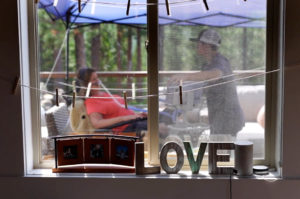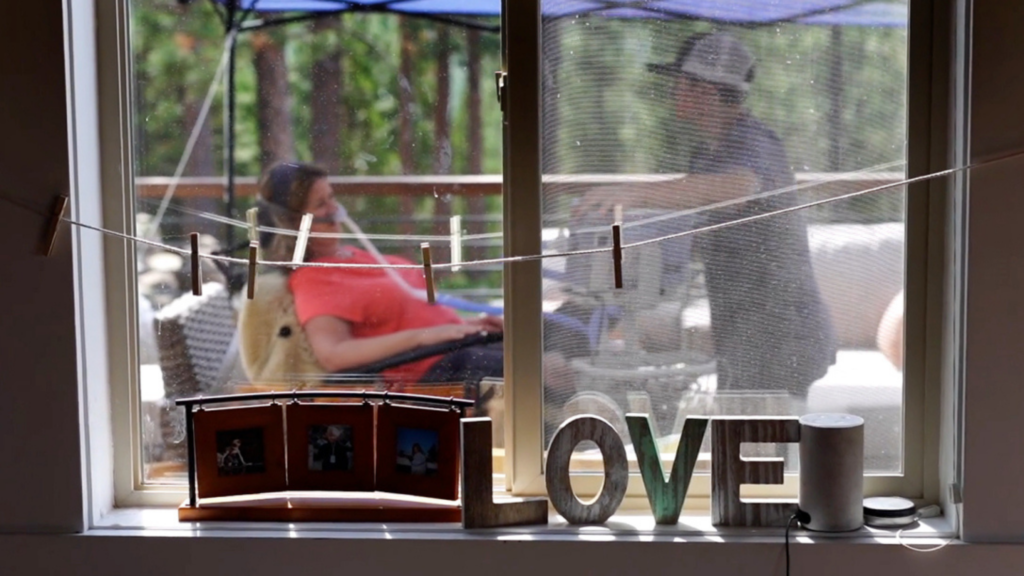Read Mercury News Article here: When the Aid-In-Dying Law Leaves You Out
A number of Californians with terminal illnesses involving progressive loss of physical ability filed suit today in federal court, along with a group of physicians who treat such patients, asserting that California’s End of Life Options Act discriminates against them. The law, Cal. Health & Safety Code § 443 et seq., allows mentally competent terminally ill adults to obtain prescription medication that can be ingested to achieve a peaceful death. This option is known as aid in dying (“AID”). However, the law prohibits assisting a patient with ingesting the medication. Cal. Health & Safety Code § 443.14(a). Californians whose disability prevents them from ingesting the AID medicine without assistance are thus denied access, they are unable to achieve a peaceful death via AID.

Justin Morris talks with his mother Sandy Morris, left, on the deck of their home in Sierraville, Calif., on a recent day. (Frame from video by Kyle Methaney))
Plaintiff-patients are terminally ill Californians with illnesses which cause progressive loss of bodily function who want the option of a more peaceful death via AID, but because of progressive illness and advancing disability, they either (1) cannot self-administer the AID medicine without assistance or (2) will not be able to self-administer the AID medicine without assistance at the time they wish to ingest the drugs. These patients are faced with a perverse choice: ingest the AID medication earlier than they would like while they retain the physical ability to do so or else be forced to endure the final ravages of their illness if they wait and lose the ability to ingest without assistance.
This civil rights class action seeks to rectify the exclusion of physically disabled individuals from the EOLOA, calling for reasonable accommodation to ensure physically disabled Californians are afforded equal benefit of the EOLOA.
Plaintiff Sandra (Sandy) Morris has advanced amyotrophic lateral sclerosis (“ALS”), a progressive nervous system disease that affects nerve cells in the brain and spinal cord, causing progressive loss of muscle control. A mother of 3, Sandy was advised by her doctors that ALS is invariably fatal, and that there is no cure. Sandy is now entirely dependent on caregivers to meet her every need. Sandy will soon lack the hand strength and coordination to ingest the AID medication without assistance. Sandy is being forced by operation of the EOLOA to decide between ending her life sooner than she wants or suffering the slow-and-painful death she desperately wants to avoid if she waits and loses the ability to ingest without assistance.
Plaintiff Lonny Shavelson, M.D. is one of Sandy’s treating physicians. He would like to assist her in her desire for AID if she needs assistance in ingesting the medications, but feels he is barred from doing so, as the EOLOA only protects physicians from civil and criminal penalties so long as they do not “assist the qualified person in ingesting the aid-in-dying drug.” Dr. Shavelson says: “I have seen the assistance prohibition of the EOLOA adversely impact dozens of patients, either forcing them to make the choice to act sooner, while physically still able to do so, or wait and then lose the ability to access AID and then endure the prolonged sort of death they hoped to avoid.”
This complaint seeks injunctive relief requiring accommodation to enable such patients access to AID. Plaintiffs assert that the State must ensure Ms. Morris, and others similarly situated, are not denied the option for a peaceful death via AID due to their disabilities.
The plaintiffs are represented by long-time patient rights advocate Kathryn Tucker, now Special Counsel at Emerge Law Group. Tucker is past Executive Director of the Disability Rights Legal Center, and the End of Life Liberty Project, which was a sponsored project of UC Hastings/UCSF Consortiuum on Law, Science and Health Policy; prior to that she served as Director of Advocacy and Legal Affairs at Compassion & Choices for many years. Tucker has litigated many cases concerning the rights of patients with terminal illness , including Glucksberg v WA, Quill v NY, Baxter v Montana, Bergman v Eden Medical Center, Hargett v Vitas, AIMS et al v DEA.
Plaintiffs are also represented by leading disability rights litigator Cat Cabalo and civil rights litigator Adam Wolf of Peiffer Wolf.
View the Complaint here: EOLOA_.08.27 Complaint_Kathryn Tucker
Kathryn Tucker
Emerge Law Group
Phone: 206-595-0097
Email: kathryn@emergelawgroup.com
Adam Wolf
Peiffer Wolf Law
Phone: 415-766-3545
Email: awolf@peifferwolf.com




